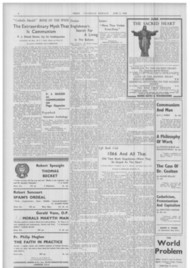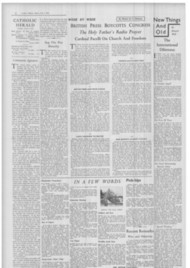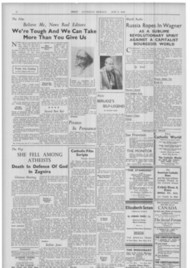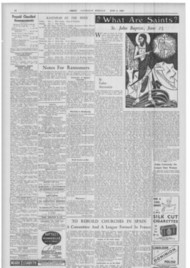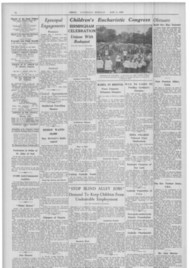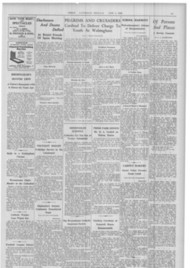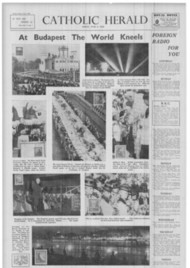Page 12, 3rd June 1938
Page 12

Report an error
Noticed an error on this page?If you've noticed an error in this article please click here to report it.
Tags
Share
Related articles
Enthusiasm In Saints' Lives
Daily Mass Guide
Daily Mass Guide
* The Importance Of * More Learning In Being John Manchester
Eighteen Saints1
St. John Baptist, June 25
By Father Martindale
E make no excuse for writing about a Saint whose name, after all, is mentioned twice every Lime we say the Confiteor. Yet this very familiarity may have caused us hardly to attend to it.
The Jews had had many floating traditions as to the appearance of a great Herald before the actual coming of the Messiasthe anointed Rescuer of the People alike from their sins and from alien oppressors. There was a very vague figure—a Prophet who should come before the End: a reappearance of Jeremias, and even the return of Elias who was popularly thought never to have died. Hence when John suddenly appeared by the caravan-routes, leaping on to the rocks beside the Jordan, blackened by the sun, haggard by his long fasting in that desert south of Jerusalem which has been described as a " landscape in the moon," so bleached is it — people were thrilled with excitement as to whether this might not be " that Prophet." And the more so, because he had resumed that rough dress of camel-hide which was more or less traditionally used by prophets, but had been abandoned for so long. Indeed, tor 400 years, no prophet had arisen in Israel.*
We omit therefore more than a reference to the prophecy of John's miraculous birth made to St. Zachary, of the Visitation of Our Lady and its marvellous effects in " gracing " his soul; or even of the giving of his name. For, seemingly so soon as it was possible, the child embarked on his ascetic life, and vanished from men's view, and, maybe, never so much as saw Our Lord again till He arrived for baptism.
John had, of course, been baptising sufficiently long before Our Lord's apparition to have created a stir throughout the land. His preaching was austere but simple and surprisingly practical—all alike had to repent (in symbolism of which his "baptism" was instituted, and forgiveness was doubtless granted to the repentant sinner on the occasion of that act—but in the concrete he appears to have been very kindly and practical—thus to soldiers he said that they were not to be turbulent, and the tax-collectors, that they were not to exact more than their proper dues. He reserved (as, we must own, Our Lord did) his fiercest invective for the Pharisees, in whom he cervainly thought he detected hypocrisy and almost angrily asked who had warned them to fly from the wrath to come. Out all the same they came, down.ece the Jordan, or sent men to question the enigmatic John, and find out what sanction he claimed to have for thus preaching and baptising. Was he the Messias Himself? or at least Elias, or the Prophet? To all, he consistently answered, " No." He was but one crying out: " Make straight, through the wilderness, a roadway for the Lord!" It was part of his immense humility to subordinate himself, all his life through, to Christ, and even, to do without more than a few thrilling moments of His beloved company.
Those moments had their climax when He appeared and demanded to be baptised. John, feeling deeply throughout himself Christ's marvellous holiness, exclaimed that he had need to be baptised by Him—" and comest Thou to me?" Our Lord asked him to suffer it to be so now," and John baptised Him, and saw the Sign of the Holy Spirit descending from heaven and " resting upon Him." and heard the divine Voice proclaiming Him the Well-beloved Son. He knew, then, as it were officially, that this was the Messias. So when Our Lord returned from His own sojourn in the wilderness, and (as I think most probable) had to pass through that same district and found John still there baptising. John was able to complete his prophecy that One was about to come up after him and pass forward on before Him—" the string of whose shoe I am not worthy to loose; whose sandals I am unfit to carry "—(a task so mean that it could not be ordered even to a Hebrew slave—by announcing that here, actually amongst them was that Victim yet Conqueror Lamb of God, who should take away from the world its load of sin. The Baptism He should impart would be to John's as fire was to water.
And forthwith, the transition began. Our Lord was met by Andrew, one of John's disciples, who then brought to Him his brother Simon. Next, two more, who were
presumably John and his brother James, crossed from the Baptist to the Lord. Time passed, and others of John's disciples were jealous of their Master, seeing so many pass over to Jesus, and hearing that His new disciples themselves were beginning to baptise, and even, that He Himself was doing so, though this was a false rumour. They went to the Baptist and lamented this. He, recalling the ancient Jewish expression whereby God is seen as the Bridegroom of His People, and transferring this title boldly to God's Son, answered with perfect abnegation: " He that hath the bride is but One "—none now save Jesus had the right to souls of men. Was there then nothing left for the Baptist? Assuredly. At a marriage, there was always the position of the " bricle,groomts friend," Who stood
be
side him, and found his happiness in that of his friend, and to this degree could make it his own. " And that my joy," said this loyalist of friends, " is full-filled." And he added—" He must increase, and I, diminish." Sufficient motto for a Christian life! Some time after this — perhaps several months—the Baptist was arrested and put in gaol by Herod Antipas whom he had rebuked for marrying his brother's wife before there had been so much as a divorce. This is not the place to explain why I think, with many, that it was not until the Voice was thus silenced that Our Lord began His own public ministry. In his prison, John heard of Christ's " mighty works," but not, that the visible Rescue of the People was beginning. His disciples, who had access to him, were maybe despondent; maybe, doubted. He sent two of them to Our Lord, who showed them yet other miracles, Messianic in their very character, including the climax — " The poor are having the good news preached to them "—and concluded: " And happy are they who shall not be scandalised in Me — shocked because I, in My Messiahship, am so very different from the nationalist Messias they may have been expecting!" And forthwith, as though to show it was not John's faith that was wavering, He spoke that splendid unparalleled panegyric of the Saint. " When you went out to the wilderness, what did you go to see? Reeds waving in the wind? Come—what went you out to see? A man clothed in soft garments? But they who wear rich garments live in kings' houses! [Did He maybe reflect that John was indeed in a king's house — in its dungeon under the banqueting room where so soon the axe was to fall.] What went you out to see? A Prophet? Yes, and I say to you, more than a Prophet!" And Our Lord declared that no man, till His own advent, had been born of woman, greater than John the Bap
tist even though the least in the New
Kingdom was mysteriously greater than he. None the less, "Elias is already come"— and this is He of whom prophecy itself made mention, when God said that His own messenger should be sent before the face of the Messias, to prepare His ways. Then we may read the story of that appalling supper-feast, when the princess danced before the drunken guests, and the enraptured king promised he would give her all that she asked for, and her mother told her to demand the Baptist's head upon a dish.. The ghastly pause followed, while the command was carried out. Herod's own soul sickened within him, and who can estimate that despair of his, Whet' the Child carried in the dish, and set it down before him?
I' would ask you to remember from these fines the absolute unselfishness of John, and to pray froni him'ehat we all of us make Christ's coming into souls easier, and not harder because of the obstacles that we may place into. His' Way.
* We read That. in the wilderness John lived on " locusts and wild honey." Tt used to he urged that these " locusts " were a sort of ea_rib bean; hut now it is known that Arabs still do catch locusts, pull off their head (like prawns . .), and pound them into a sort of cake. On the other hand, the "wild honey " is now regarded as having been a sort of gum that oozes out of a very harsh scrub as can grow no the desert.
blog comments powered by Disqus





